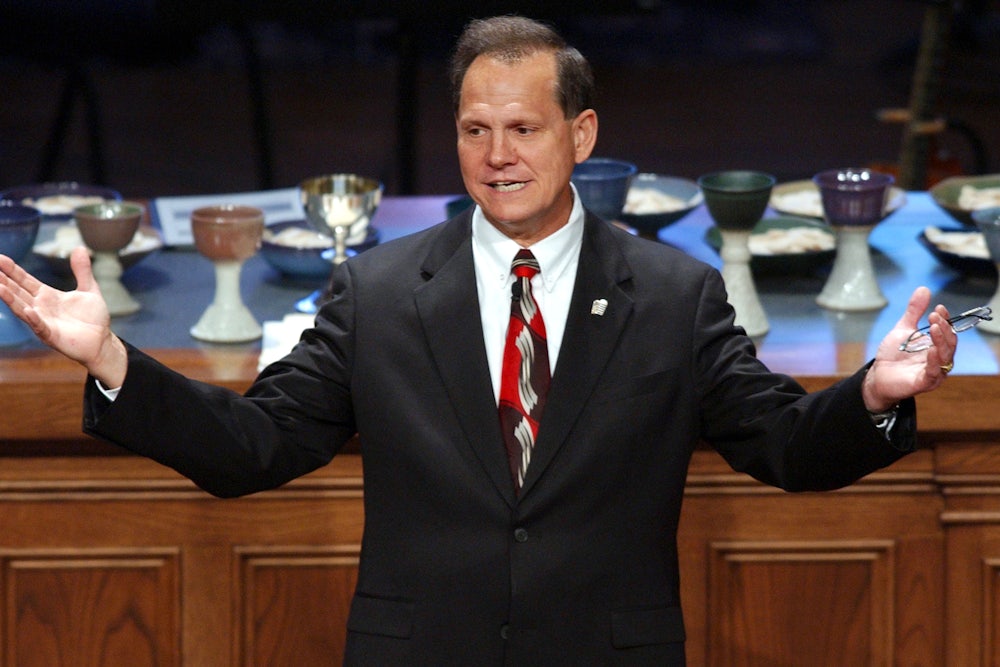Alabama’s chief justice will crusade from the bench no more. In a 50-page ruling on Friday, the state Court of the Judiciary found Roy Moore guilty of six judicial ethics violations for ordering the state’s probate judge to resist the U.S. Supreme Court’s marriage equality verdict. Moore is now suspended without pay for the rest of his term, which ends in 2019. It’s an impeachment de facto if not de jure: Alabama has age restrictions for its supreme court justices, and Moore, 69, is too old to run for his seat again. His career on the state’s highest court is over.
The religious right should be in uproar. But outrage has thus far been mostly restricted to the Liberty Counsel, whose founder, Mat Staver, represented Moore in his failed bid to keep his seat on the bench. From the pews, crickets: The Family Research Council has said nothing on social media or in a press release. Neither has FRC’s president, Tony Perkins, though he’s defended Moore in the past. The First Liberty Institute has been similarly quiet. So too has the Alliance Defending Freedom and even Focus on the Family.
Why the silence? The religious right is suffering an identity crisis, becoming increasingly fractured as it struggles to adapt to recent liberal victories in the culture war that it started decades ago. And few of the movement’s factions, it seems, see much benefit in aligning themselves publicly with Moore.
Values voters were his biggest backers since the early 1990s when, as a Etowah County Circuit Court judge, he was sued by the American Civil Liberties Union for displaying a wooden plaque of the Ten Commandments in his courtroom. Ralph Reed and other religious right figures organized a 6,000-strong rally on his behalf in Dallas, Texas. (The suits were eventually dismissed.) And in 2001, fundamentalist fame propelled him to role as the chief justice of the Alabama Supreme Court, an elected position. He didn’t disappoint: Once there, he promptly re-engaged the nation’s culture wars by commissioning, then erecting, a two-ton granite monument of the Ten Commandments on courthouse property.
Cue another lawsuit, filed by the ACLU, the Southern Poverty Law Center, and Americans United for Separation of Church and State (where, full disclosure, I used to work). Moore didn’t win this second skirmish, but he refused to concede defeat, defying a court order to remove the monument amid massive protests in his support. Thus, he earned his first impeachment—only to return, zombie-like, after winning another election to the state supreme court in 2012.
Moore won’t be able to repeat that resurrection, but this doesn’t mean we’ve heard the last of him. He’s always had his sights on the governor’s mansion; his carefully constructed (and inescapably public) fundamentalist bona fides are a prerequisite to a successful political career as an Alabama Republican. But there are challenges here too. Despite his national fame as The Ten Commandments Judge, he lost a gubernatorial primary in 2006. It’s still too early to tell if he has a real chance in 2018. Maybe his latest act of martyrdom will move the people of Alabama again.
That, however, would be a significant reversal of fortune for the ex-judge. His life and career now resemble one of his religion’s parables. He still makes national headlines, but his rallies no longer draw thousands of loyalists. He lost his last great moral crusade, but would be fortunate to win state office—forget national office. His friends distance themselves; he is plagued by a disappointing reprobate son.
In short: Moore went from commanding the attention of the nation’s biggest and most powerful religious right leaders to collecting small fry. Even the Liberty Counsel, which is well-known for its defense of Kim Davis, pulls in paltry sums compared to its direct competitors in the movement.
What changed? It’s possible that Moore’s tactics finally went too far, even for the religious right. The Alliance Defending Freedom and other prominent organizations have been focused primarily on undermining local and state anti-discrimination laws that include protections for LGBT people. Though they haven’t given up on the marriage fight, they seem to have refocused on more achievable aims.
Public opinion justifies their strategic shift: The American public now mostly supports marriage equality, but thinks more favorably of allowing conservative Christians to exempt themselves from certain anti-discrimination provisions. For a movement trying to survive serious demographic challenges, that’s no small consideration. Moore, meanwhile, seems married to tactics that are now noticeably out-of-step with the movement he’s always counted on for support.
“It’s not about me,” he told crowds in 2003. But it always has been so, and perhaps his compatriots have had enough. Pride really does go before a fall.
